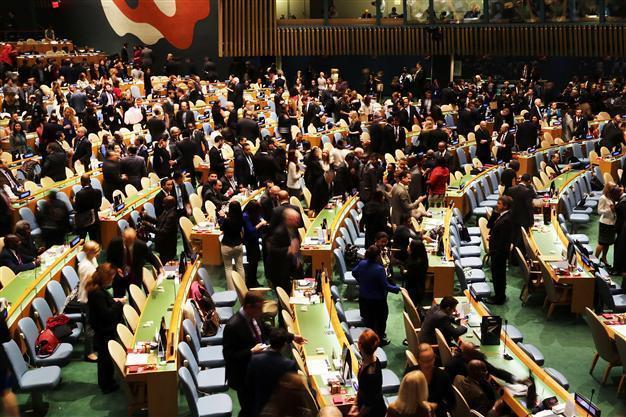Turkey defeated in vote for UN Security Council seat
UNITED NATIONS - Associated Press

AFP Photo
Turkey failed in its effort to join the U.N.’s most powerful body on Oct. 16, when Venezuela, New Zealand, Spain, Angola and Malaysia were elected to coveted Security Council seats.Neither Turkey nor Spain got enough votes in the first or second ballot of the election by the General Assembly’s 193 member states. They were competing with New Zealand for two seats in their group, called "Western Europe and Others." New Zealand easily gained a seat on the first ballot, while Spain made it on the third.
The 193-member U.N. General Assembly elected Spain with 132 votes in the third round of voting against 60 votes for Turkey.
Turkey got 72 votes in the second round against 121 for Spain. The board membership requires a minimum of 129 votes.
Venezuela won 181 votes in its favor, Malaysia won 187 votes, Angola won 190 votes and New Zealand won 145 votes.
Special attention had been on Turkey as it is under growing pressure to do more about the war in Syria pushing up against its border. Turkey lobbied heavily for a council seat, with its foreign minister hosting a party at the iconic Waldorf Astoria hotel the night before the vote.
The Turkish mission to the U.N. was not available for immediate comment.
The five winners will join the Security Council on Jan. 1 and serve through 2016 as non-veto-wielding members. The five will replace Argentina, Australia, Luxembourg, South Korea and Rwanda.
Venezuela’s socialist government was unopposed for the single seat allocated to Latin America and the Caribbean. Angola was the only candidate for an African seat, and Malaysia had no opposition for an Asian seat.
With Venezuela’s victory, Russia and China will likely gain an ally on some key international issues that have put them at odds with the three Western permanent members - the U.S., Britain and France. Venezuelan President Nicolas Maduro has close ties with Syria’s President Bashar Assad and Iran and has strongly supported Russia in the Ukraine crisis.
In Caracas, a jubilant Maduro appeared on television shortly after the General Assembly vote and led his cabinet in an extended round of applause. He said the win showed the support the "entire world" has for the late President Hugo Chavez’s vision.
Venezuela’s foreign minister, Rafael Ramirez, said the win came despite a "malign campaign against our country."
The victory comes on the heels of a report from another U.N. body condemning Venezuela for taking political prisoners during a crackdown on anti-government street protests this spring.
The United States, which publicly opposed Venezuela’s last attempt to join the council in 2006, did not do so this time and would not discuss how it voted Thursday. Ten countries abstained in that vote.
"Unfortunately, Venezuela’s conduct at the U.N. has run counter to the spirit of the U.N. Charter, and its violations of human rights at home are at odds with the Charter’s letter," U.S. Ambassador Samantha Power said in a statement shortly after the vote. "The United States will continue to call upon the government of Venezuela to respect the fundamental freedoms and universal human rights of its people."
Venezuela’s two-year term will give the country a high-profile arena for fiery rhetoric - much of it likely from Chavez’s daughter, Maria Gabriela Chavez, who was recently named deputy ambassador to the U.N.
Rights observers expressed concern at some of the newly elected council members.
"The Security Council’s new membership could prove more problematic on human rights issues, with several generally rights-friendly countries leaving and others coming on board with poor voting records," Philippe Bolopion, the U.N. director of Human Rights Watch, said in a statement. "This is particularly true of Venezuela, which has consistently challenged protection efforts at the (U.N.) Human Rights Council, but also of Angola and Malaysia, which need to demonstrate a more human rights-oriented approach in New York than they did in Geneva."
The countries’ foreign ministers have been in town lobbying hard for support, with splashy banquets and other events. The ballots are secret, and to win, each country had to obtain support of two-thirds of all General Assembly members present, or a minimum of 129 votes if all 193 members participate.
New Zealand’s foreign minister, Murray McCully, said his country was "obviously touched" to receive such strong support, with 145 votes.
















